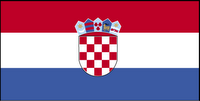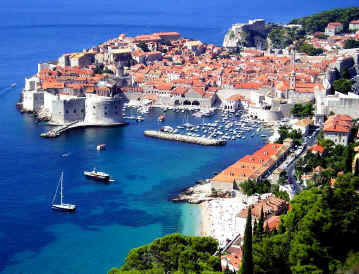
HRVATSKA
[I lost two hours of work on this post, so it's the second time through... apologies if this sucks]
Where? Southeastern Europe, bordering the Adriatic Sea
How Big? Just slightly bigger than Costa Rica, again, about the size of West Virginia. Population is similar, just slightly bigger than Costa Rica, again, about the size of Metro Atlanta.
Something I learned from the CIA Fact Book... Not too much, because I wrote a big paper on Croatia back in my school days. I didn't know how prone Croatia was to catastrophic earthquakes. Basically, Croatia split from Yugoslavia in 1991 and suffered through a war (basically with Serbia) for the next four years. That war was pretty bad, but Croatia didn't suffer as much as Bosnia. After the war, Croatia's economy got pretty heated up.
Geopolitical significance... Croatia was in the papers a lot more a decade ago than today, but it's still pretty important. Croatia's location is a gateway between Western Europe and the Balkans, and it's a key shipping center for both land and sea routes. Croatia's international profile has risen so much that it is now in negotiations for admittance into the European Union.
Fun... Croatia is kind of a center of invention. The inventors of the ink pen, the torpedo, and the parachute were all Croats. Plus, one of the most notable inventors of all time was born in Croatia, though he was an ethnic Serb and worked in the USA: Nikolai Tesla, whose advancements in electrical engineering and wireless communications rivaled anyother inventor. Also, middle ages Croat soldiers introduced neckties to the rest of the world. On another note, Croatia is a gem of a tourist destination. I'd like to go to Dubrovnik.
Soccer:
The Fiery Ones, like Serbia and Montenegro below, didn't play as their own team until Yugoslavia fell apart. Croatia, however, was ready to go on their own and had significant initial success, thanks to superstars that dominated the Yugoslavian team, like Davor Suker, Zvonomir Boban or Robert Jarni. In 1998, Croatia blew up in France, stunning the world with their third place finish and Suker's golden boot. Croatia only lost to Argentina in the group and eventual champs France in the Semis. In fact, Croatia scored the only non-penalty goal against France in the entire tournament. 2002 was a slight step back, partly because the team was aging, and partly because they performed really strangely. They lost a close game on a PK to Mexico, then they beat Italy straight up. But then they lost to Ecuador in the finale, allowing Italy to move on. Weird.
Qualifying this time around went pretty well. Croatia didn't lose a game, and only drew with Bulgaria, Hungary and (???) Malta. They did sweep the two games against Sweden though, and took 24 points out of a possible 30 in a decent group.
The team is based in leagues all over Europe, with 4 in each of Croatia and Germany. The main thing is that this is a different team from the one that burst on the scene in France. Only 4 of the players on the roster were born before 1975, though a few of them are key players. The youth movement will be key though.
Some of the key players will be Dario Simic, a key defender for AC Milan; the Kovac brothers (Robert a stour defender at Juventus, Niko a decent midfielder for Hertha Berlin); and Dado Prso, probably the best scoring threat.
The player to watch, for the drama as much as for the promise, is Niko Kranjcar. He's young, but has a great chance to make a name for himself. The drama is that his father is the manager of the team, and his selection a while ago initially reeked of nepotism. But Niko's showed up for the national side, scoring frequently and stepping his game up. A big tournament in Germany could mean an exorbitant transfer fee later this summer, as he's rumored to want to move to Barcelona.
The schedule isn't exactly a cakewalk though, as the group includes prohibitive favorite Brazil and two teams in Japan and Australia that are about as talented as Croatia. But the home continent advantage should help, along with experience in continental football.
They open with Brazil, which should not be fun for Croatia. Expect Brazil to score early and often, but some of the young players on Croatia get their nerves calmed. Ronaldo gets closer to the all time scoring record, and Ronaldinho makes the millions spent promoting him worth it. 3-0 Brazil.
The second match against Japan picks up where Brazil left off, with Japan scoring twice in the first half. But after halftime, Croatia begins to take advantage of their edge in height, scoring three times in the second half to win 3-2. This could be one of the more exciting games in the Cup due to the matchup of styles.
Croatia enters the final match against Australia in a good position to advance. An early goal by Kewell puts things in doubt though. With Brazil already advancing, a draw by Japan wouldn't have been out of the question, so things get tense. Croatia equals late though, drawing 1-1.
They finish the group in second place, drawing Italy in the round of 16. A battle for Adriatic supremacy turns out to be one of the slower, more boring matches of the tournament, with a 60th minute Del Piero goal holding up. Croatia goes home, 1-0 Italy.
All in all, it'll be a semi-satisfying tournament. The losses to Brazil and Italy will sting, and the Aussie draw won't be anything to write home about. But the win over Japan will be a great moment, and the young players will get experience that'll pay off in 2010.
If the World Cup were March Madness, Croatia would be... a team in a good conference that's recently shown up big, but is currently going through a rebuilding process. I keep thinking Marquette for some reason. Any better ideas?
Dubrovnik: I'd roll up in a sweet 50 foot yacht.
Saturday, June 03, 2006
#15: Vatreni
Posted by
LD
at
12:11 PM
![]()
Subscribe to:
Post Comments (Atom)

0 comments:
Post a Comment